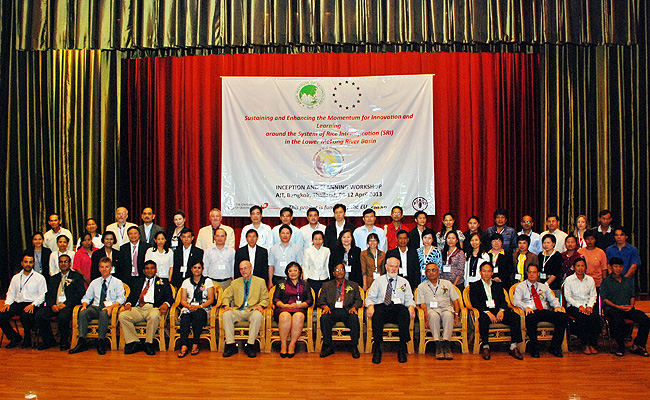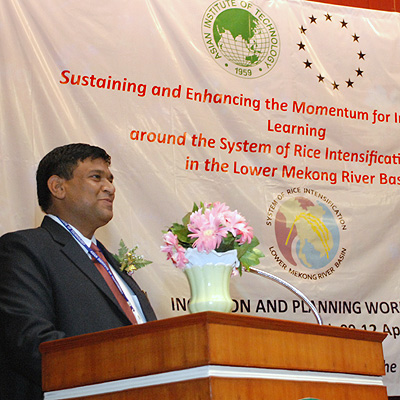Asian Institute of Technology (AIT), Thailand, 9 April
2013
Scientists at the Asian Institute of Technology (AIT) are set to
introduce a “more intelligent pathway” for cultivating rice in
Thailand, Laos, Cambodia and Vietnam through sustainable
agriculture development and System of Rice Intensification (SRI).
introduce a “more intelligent pathway” for cultivating rice in
Thailand, Laos, Cambodia and Vietnam through sustainable
agriculture development and System of Rice Intensification (SRI).
In a bid to unlock sustainable
solutions for managing agriculture systems in the Lower Mekong
River Basin region, AIT researchers have embarked on a five-year
project that aims to intensify the practice of sustainable
agriculture by promoting the SRI as an entry point for innovations
that could benefit millions of poor small-scale farmers.
solutions for managing agriculture systems in the Lower Mekong
River Basin region, AIT researchers have embarked on a five-year
project that aims to intensify the practice of sustainable
agriculture by promoting the SRI as an entry point for innovations
that could benefit millions of poor small-scale farmers.
By the year 2050, the global
population is projected to be 9 billion. According to the United
Nations, feeding such a large number, along with tackling climate
change and maintaining productive land and sufficient water
resources, will require dramatic improvements for managing the
world’s agricultural systems.
population is projected to be 9 billion. According to the United
Nations, feeding such a large number, along with tackling climate
change and maintaining productive land and sufficient water
resources, will require dramatic improvements for managing the
world’s agricultural systems.
Against this backdrop, AIT in Thailand
has been awarded a landmark Euros 3.4 million (US$ 4.37 million)
grant by the European Union for a project titled: “Sustaining
and Enhancing the Momentum for Innovation and Learning around the
System of Rice Intensification (SRI) in the Lower Mekong River
Basin.”
has been awarded a landmark Euros 3.4 million (US$ 4.37 million)
grant by the European Union for a project titled: “Sustaining
and Enhancing the Momentum for Innovation and Learning around the
System of Rice Intensification (SRI) in the Lower Mekong River
Basin.”
The grant enabled the launch on 9 April 2013 of the Asian Centre
of Innovation for Sustainable Agriculture Intensification (ACISAI) at
its new home situated on the ground floor of the AIT Administration
Building.
The ACISAI was officially inaugurated at a brief ceremony by Prof.
Jayant K. Routray, Chairman of the AIT Academic Senate,
on behalf of Acting AIT President Prof. Worsak
Kanok-Nukulchai, along with Prof. Norman T. Uphoff, Director, Cornell
Institute for Public Affairs, Cornell University; Dr. Rosa S. Rolle,
Senior Agro-Industry and Post Harvest Officer, Food and Agriculture
Organization (FAO) Regional Office for Asia and the Pacific; and Prof.
Amir Kassam, OBE, FSB, School of Agriculture and Development,
University of Reading.
The project aims to support the
intensification of small-scale agriculture as a performing model
that could ultimately provide jobs to millions of landless farmers
and enhance food security. By contributing to poverty reduction,
the project is designed to make progress towards the Millennium
Development Goals (MDGs) No. 1 to Eradicate Extreme Poverty and
Hunger by 2015.
intensification of small-scale agriculture as a performing model
that could ultimately provide jobs to millions of landless farmers
and enhance food security. By contributing to poverty reduction,
the project is designed to make progress towards the Millennium
Development Goals (MDGs) No. 1 to Eradicate Extreme Poverty and
Hunger by 2015.
System of Rice Intensification (SRI)
is an emerging alternative technology to conventional rice
cultivation techniques that instills a social dimension to farming
to produce healthy and profitable crops using less water and less
seed, and through skillful management of plants, soils, water and
nutrients, says project team leader Dr. Abha Mishra.
is an emerging alternative technology to conventional rice
cultivation techniques that instills a social dimension to farming
to produce healthy and profitable crops using less water and less
seed, and through skillful management of plants, soils, water and
nutrients, says project team leader Dr. Abha Mishra.
“It really is a less is more
approach,” adds project regional coordinator Dr. Prabhat Kumar.
“It requires less water, seed, energy, carbon footprint and investment
costs while at the same time conserving valuable input resources
and producing higher yields.”
approach,” adds project regional coordinator Dr. Prabhat Kumar.
“It requires less water, seed, energy, carbon footprint and investment
costs while at the same time conserving valuable input resources
and producing higher yields.”
Over half the world’s people depend on
rice for survival. Moreover, 500 million small-scale farms
world-wide, most still rain-fed, provide up to 80 per cent of the
food consumed in a large part of the developing world. Agriculture
is the single largest employer in the world, providing livelihoods
for 40 per cent of global population. It is also the largest
source of income and jobs for poor rural households.
rice for survival. Moreover, 500 million small-scale farms
world-wide, most still rain-fed, provide up to 80 per cent of the
food consumed in a large part of the developing world. Agriculture
is the single largest employer in the world, providing livelihoods
for 40 per cent of global population. It is also the largest
source of income and jobs for poor rural households.
More and more scientists, researchers,
and analysts now believe that boosting sustainable agriculture,
especially among small-scale farmers, can not only overcome hunger
and poverty but can address other challenges from climate change.
Agriculture is very much at the center of the global
transition to a resource-efficient, low-carbon green economy, they
say.
and analysts now believe that boosting sustainable agriculture,
especially among small-scale farmers, can not only overcome hunger
and poverty but can address other challenges from climate change.
Agriculture is very much at the center of the global
transition to a resource-efficient, low-carbon green economy, they
say.
Dr. Mishra says: “Sustainable
agriculture has the potential to reduce the negative externalities
associated with conventional agricultural methods, enhance
environmental service flows, reduce national expenditures for
food, foster new social infrastructure and cultural relations,
help the emergence of new green enterprises that drive
local communities’ economic growth, and ultimately improve the
well-being of both rural and urban populations.”
agriculture has the potential to reduce the negative externalities
associated with conventional agricultural methods, enhance
environmental service flows, reduce national expenditures for
food, foster new social infrastructure and cultural relations,
help the emergence of new green enterprises that drive
local communities’ economic growth, and ultimately improve the
well-being of both rural and urban populations.”
Dr. Mishra holds that the
“collaborative” nature of SRI makes it an excellent “model” to
initiate multidisciplinary work involving various actors to combat
climate change; starting from the local rice farmer in the Lower
Mekong River Basin region and leading right up to the global-level
policy maker.
“collaborative” nature of SRI makes it an excellent “model” to
initiate multidisciplinary work involving various actors to combat
climate change; starting from the local rice farmer in the Lower
Mekong River Basin region and leading right up to the global-level
policy maker.
With the launch of the Asian Centre of
Innovation for Sustainable Agriculture Intensification (ACISAI) in
Thailand, AIT is now the region’s foremost institute for linking
local practitioners to global actors and institutions to meet the goals
of food security and environmental sustainability.
Innovation for Sustainable Agriculture Intensification (ACISAI) in
Thailand, AIT is now the region’s foremost institute for linking
local practitioners to global actors and institutions to meet the goals
of food security and environmental sustainability.


